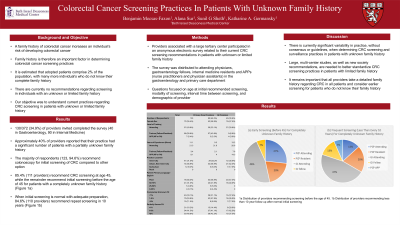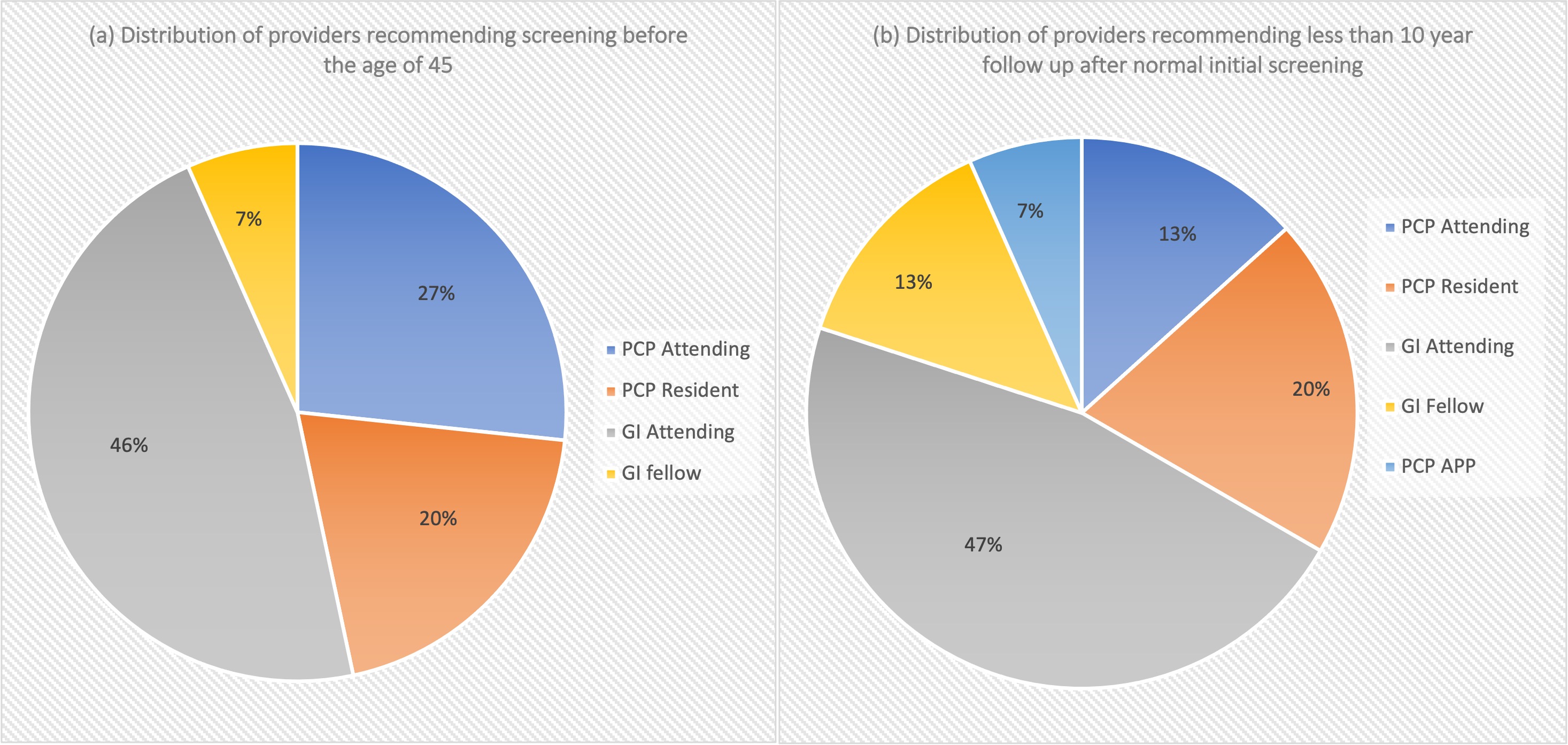Monday Poster Session
Category: Colorectal Cancer Prevention
P2109 - Colorectal Cancer Screening Practices in Patients With Unknown Family History
Monday, October 28, 2024
10:30 AM - 4:00 PM ET
Location: Exhibit Hall E

Has Audio
- BM
Benjamin Mecsas-Faxon, MD
Beth Israel Deaconess Medical Center
Boston, MA
Presenting Author(s)
Benjamin Mecsas-Faxon, MD, Alana Sur, BS, Sunil Sheth, MD, Katharine Germansky, MD
Beth Israel Deaconess Medical Center, Boston, MA
Introduction: Family history is an important factor in determining colorectal cancer (CRC) screening. Accordingly, screening recommendations are based on the calculated risk. However, there are no recommendations regarding screening in individuals with an unknown or limited family history. It is estimated that adopted patients comprise 2% of the population, with many more patients without a complete family history. We aimed to understand current practices regarding CRC screening in this subset.
Methods: Providers associated with a large tertiary center participated in an anonymous electronic survey related to their current CRC screening recommendations in patients with unknown or limited family history. The survey included questions regarding age at initial recommended screening, modality of screening, interval time between screening, as well as provider demographics.
Results: Three hundred seventy-two providers received this survey of which 130 responded (40 in Gastroenterology, 90 in Internal Medicine). The demographics of the providers (specialty, sex, level of training, years of experience and practice location) are described in Table 1. Although the majority of the providers reported that the number of their patients with a completely unknown family history is low (11.5%), approximately 40% reported that their practice had a significant number of patients with a partially unknown family history. The majority (111, 85.4%) recommend CRC screening at age 45, while the remainder recommend initial screening before the age of 45 for patients with a completely unknown family history (Figure 1a). The majority of respondents (123, 94.6%) recommend colonoscopy for initial screening of CRC. When initial screening is normal with adequate preparation, 110 (84.6%) participants recommend repeat screening in 10 years. The remainder recommended follow up at variable intervals of 1, 3 and 5 years (Figure 1b).
Discussion: There is currently significant variability in practice, without consensus or guidelines, when determining CRC screening and surveillance practices in patients with unknown family history. Large, multi-center studies, as well as new society recommendations, are needed to better standardize CRC screening practices in this patient population. For now, it remains important that all providers take a detailed family history regarding CRC in all patients and consider earlier screening in their patients who do not know their family history.

Note: The table for this abstract can be viewed in the ePoster Gallery section of the ACG 2024 ePoster Site or in The American Journal of Gastroenterology's abstract supplement issue, both of which will be available starting October 27, 2024.
Disclosures:
Benjamin Mecsas-Faxon, MD, Alana Sur, BS, Sunil Sheth, MD, Katharine Germansky, MD. P2109 - Colorectal Cancer Screening Practices in Patients With Unknown Family History, ACG 2024 Annual Scientific Meeting Abstracts. Philadelphia, PA: American College of Gastroenterology.
Beth Israel Deaconess Medical Center, Boston, MA
Introduction: Family history is an important factor in determining colorectal cancer (CRC) screening. Accordingly, screening recommendations are based on the calculated risk. However, there are no recommendations regarding screening in individuals with an unknown or limited family history. It is estimated that adopted patients comprise 2% of the population, with many more patients without a complete family history. We aimed to understand current practices regarding CRC screening in this subset.
Methods: Providers associated with a large tertiary center participated in an anonymous electronic survey related to their current CRC screening recommendations in patients with unknown or limited family history. The survey included questions regarding age at initial recommended screening, modality of screening, interval time between screening, as well as provider demographics.
Results: Three hundred seventy-two providers received this survey of which 130 responded (40 in Gastroenterology, 90 in Internal Medicine). The demographics of the providers (specialty, sex, level of training, years of experience and practice location) are described in Table 1. Although the majority of the providers reported that the number of their patients with a completely unknown family history is low (11.5%), approximately 40% reported that their practice had a significant number of patients with a partially unknown family history. The majority (111, 85.4%) recommend CRC screening at age 45, while the remainder recommend initial screening before the age of 45 for patients with a completely unknown family history (Figure 1a). The majority of respondents (123, 94.6%) recommend colonoscopy for initial screening of CRC. When initial screening is normal with adequate preparation, 110 (84.6%) participants recommend repeat screening in 10 years. The remainder recommended follow up at variable intervals of 1, 3 and 5 years (Figure 1b).
Discussion: There is currently significant variability in practice, without consensus or guidelines, when determining CRC screening and surveillance practices in patients with unknown family history. Large, multi-center studies, as well as new society recommendations, are needed to better standardize CRC screening practices in this patient population. For now, it remains important that all providers take a detailed family history regarding CRC in all patients and consider earlier screening in their patients who do not know their family history.

Figure: 1a. Distribution of providers recommending screening before the age of 45
1b. Distribution of providers recommending less than 10 years follow up after normal initial screening
1b. Distribution of providers recommending less than 10 years follow up after normal initial screening
Note: The table for this abstract can be viewed in the ePoster Gallery section of the ACG 2024 ePoster Site or in The American Journal of Gastroenterology's abstract supplement issue, both of which will be available starting October 27, 2024.
Disclosures:
Benjamin Mecsas-Faxon indicated no relevant financial relationships.
Alana Sur indicated no relevant financial relationships.
Sunil Sheth indicated no relevant financial relationships.
Katharine Germansky indicated no relevant financial relationships.
Benjamin Mecsas-Faxon, MD, Alana Sur, BS, Sunil Sheth, MD, Katharine Germansky, MD. P2109 - Colorectal Cancer Screening Practices in Patients With Unknown Family History, ACG 2024 Annual Scientific Meeting Abstracts. Philadelphia, PA: American College of Gastroenterology.
